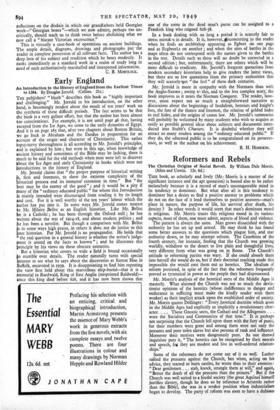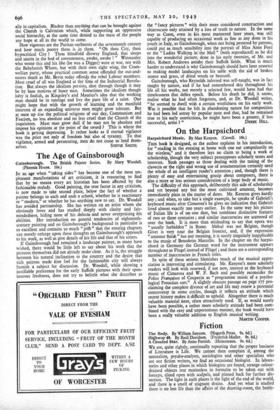Reformers and Rebels
THIS book, so scholarly and lively (Mr: Morris is a master of the significant instance and the apt quotation) is bound also to be rather melancholy because it is a record of man's unconquerable mind in its tendency to domineer. But what after all is this tendency to domineer but a desire to find a positive answer to problems which do not on the face of it lend themselves to positive answers—man's place in nature, the purpose of life, his survival after death, his destiny ? In other words it would seem that man's dominant mood is religious. Mr. Morris traces this religious mood in its various aspects, most of them, one must admit, aspects of blood and violence.
The pattern is always the same. Man grows dissatisfied with the authority he has set up and armed. He may think he has found some better answers to the questions which plague him, and tear authority down, or he may attempt reform. The Cenobites of the fourth century, for instance, finding that the Church was growing worldly, withdrew to the desert to live plain and thoughtful lives, very different from what was going on in Rome. The Church's attitude to reforming parties was wary. If she could absorb them into herself she would do so, but if their doctrinal teaching made this impossible she would root them out as heretics. The idealism of reform persisted, in spite of the fact that the reformers frequently proved as tyrannical in power as the people they had dispossessed.
Mr. Morris's analysis of the heretical sects of the Middle Ages is masterly. What alarmed the Church was not so much the devia- tionist opinions of the heretics (whose indifference to danger and endurance in suffering must make the kindly reader wish them weaker) as their implicit attack upon the established order of society. Mr. Morris quotes Dollinger : " Every_heretical doctrine which arose in the Middle Ages had explicitly or implicitly a revolutionary char- acter. . . . Those Gnostic sects, the Cathari and the Albigenses . . . were the Socialists and Communists of that time." It is perhaps not surprising that the Church fell upon them with the fury of panic, for their numbers were great and among them were not only the peasants and poor town slaves but also persons of rank and influence. Moreover their motives were dangerously pure. As one shrewd inquisitor puts it, "The heretics can be recognised by their morals and speech, fos they are modest and live in well-ordered relation- ships."
Some of the reformers do not come out of it so well. Luther rallied the peasants against the Church, but when, acting on his advice, they started to burn castles, he wrote thus to their enemies: "Dear gentlemen. .. stab, knock, strangle them at will," and again, "Better the death of all the peasants than the princes." But if the Church was well suited to a feudal society (the great Aquinas himself justifies slavery, though he does so by reference to Aristotle rather than the Bible), she was in a weaker position when industrialism began to develop. The party of reform was soon to have a dubious
ally in capitalism. Blacker than anything that can be brought against the Church is Calvinism which, while supporting an oppressive social hierarchy, at the same time denied to the mass of the people any hope at all in the world to come.
How vigorous are the Puritan outbursts of the seventeenth century and how much poetry there is in them. "Oh thou City, thou hypocritical City Thou blindfold drowsy England, that sleeps and snorts in the bed of covetousness, awake, awake ! " Winstanley who wrote this and his like (he was a Digger) were at war, not with the Babylonish Whore, but with their own right wing, the Crom- wellian party, whose practical common sense offended the out-and- outers much as Mr. Bevin today offends the rebel Labour members. Most cruel of all was England at the time of the Industrial Revolu- tion. But always the idealism persists, shot through though it may be by base motives of baser men. Sometimes the idealism though lofty is foolish, as Kingsley's and Maurice's idea that the working man should be in tutelage and live the pure life of a saint. One might hope that with the growth of learning and the manifold interests of an expanding universe men might grow tolerant. But at once up rise the political religions of our day, Communism and Fascism, no less absolute and no less cruel than the Church of the inquisitors. Must man grow dull if he may not be absolute and impose his opinions at the point of the sword ? This is where the book is getting depressing. It rather looks as if eternal vigilance was the price not only of freedom but also of tyranny. To that vigilance, armed and persecuting, men do not cease to lend them-











































 Previous page
Previous page